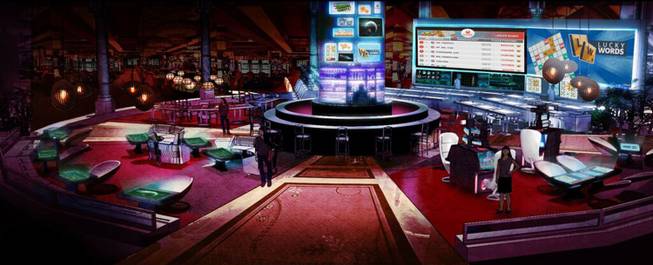
Gamblit Gambling (TNS)
This is a rendering of a casino gaming lounge of the future by Gamblit Gaming, a technology provider based in Glendale, Calif.
Tuesday, Aug. 4, 2015 | 2 a.m.
BALTIMORE — Many slot machines on casino floors bear images of faded but recognizable movies or TV shows such as "Sex and the City," "Ghostbusters" or the still-running "Wheel of Fortune," appealing to an older generation of players who reliably play the random games of chance.
But time and technology are catching up with traditional slot machines, which don't hold anywhere near the same appeal for younger players as they do for their parents. Slots simply can't compete with the variability and social nature of the window through which most young people view the world — their smartphones.
Slots play "has kind of been slowing down nationally. It's not advancing as fast as table play," said David G. Schwartz, director of the Center for Gaming Research at the UNLV. "Today, anybody who has the disposable income to play a slot machine has something in their pocket that is way more entertaining than that slot machine."
Anxious about millennials' indifference to slot machines, manufacturers are testing more social and interactive games that would make the casino floor of the future look like a cross between a TV game show and a NASA flight control room.
"The slot floors that you see today are not going to be in existence 10 years from now," said James Murren, chairman and CEO of MGM Resorts International, which is building a $1.2 billion casino in Maryland that will be the state's sixth.
Maryland's largest casinos already have been reducing their slots offerings, freeing up space for popular table games or restaurants.
Although their popularity may be ebbing, slot machines still generated $680 million at the state's five casinos in the fiscal year ending June 30. When statewide gaming revenue in Nevada peaked at $12.8 billion in 2007, slots accounted for $8.4 billion — more than 65 percent — of the total. Last year, Nevada’s slots brought in $6.7 billion, or about 61 percent of the state’s $11 billion total.
Maryland regulators say they are preparing for the day when the state's casinos seek to add arcade-style games to revitalize their slots floors.
"We are aware that the industry is starting to look at increasing the skill factor in gaming, and we are reviewing statute to determine to what extent that is permitted under current law," said Charles LaBoy, the state's assistant director for gaming.
It's not that slot machines haven't evolved. Today's machines are more akin to video games and some even mimic arcade rides, rocking your chair like a mechanical bull. Many casinos offer machines with escalating jackpots, curved touch screens or video clips of popular TV shows.
But experts say an important lure is missing from the games of chance: skill-based tasks allowing players to compete against each other rather than passively playing only against the house. Game manufacturers even envision players tracking their progress and the competition on their phones.
"The products are going to look different, it's going to be configured differently. You can have more social settings, more interactive games, more social games where people are playing against one another," MGM's Murren said.
In the future, casino floors may have giant leader boards listing top competitors vying for prizes in various skill games.
Eric Meyerhofer, the CEO of Gamblit Gaming, said he envisioned a "modern-day arcade for adults in a casino." The California-based company has developed a number of games that could be incorporated, assuming state regulators consent.
The games include the vocabulary game "Lucky Words" and the adventure game "Police Pooches vs. Zombie Cats: In Time." Gamblit says the latter, animated game "combines fun physics-based shooting puzzles with the excitement of gambling" as you "battle obnoxious zombie cats through different time-periods of history with your group of trusty police pooches."
A Gamblit rendering of a future casino lounge depicts flat, touch-screen gaming tables ("you can put your drink on it," Meyerhofer said) surrounding a bar and giant video boards.
Nevada regulators are developing rules to govern arcade-style casino games. New Jersey already permits certain types of skill-based gaming.
"Between Nevada and New Jersey, it's going to create quite a ripple effect that isn't going to only roll across North America but also internationally," Meyerhofer said.
In Maryland, "none of our casinos have submitted a request for a skill-based game, but that is not surprising as there is not a whole lot of content currently available," said LaBoy, noting that some existing electronic games of chance "include elements of skill."
Robert J. Norton, president of Maryland Live, the state's largest casino, called the idea of such a new world intriguing.
"I think so much of whether or not that becomes reality has to do with how those games are developed and the type of people involved in making those developments," said Norton, who also heads Cordish Global Gaming Group, the gaming division of Baltimore-based developer The Cordish Cos. "I think it's a little too early to pull out the crystal ball. If they do it right, it could be great."
Industry executives have long known they couldn't afford to stand pat. Slot machines stretch across many casinos like rows of old-fashioned phone booths — and are, to many millennials, just as irrelevant.
"Everybody in the industry realizes we have to evolve," said Philip Gelber, senior vice president of product development at Scientific Games.
"I don't think the traditional slot machine will go away anytime soon. There are players who want the truly random game." But with the new regulations, Gelber said, "it's going to be a much more open environment. The regulations today are written so in most jurisdictions the slot machine is an isolated thing. It doesn't talk to the outside world. Most of the regulations were written before the Internet."
Millennials — those born between 1980 and the mid-2000s — represent about one-third of the American population and are the country's largest generation, according to a White House report.
Analysts say slot machine enthusiasts skew older than that — in their 50s and beyond — and are more often women than men.
To hook younger players, casinos may need to mimic the Xbox and PlayStation competitions they are accustomed to, experts said.
"This generation loves to compete with each other on machines. They're used to doing that," said Richard McGowan, a casino expert at Boston College's Carroll School of Management. "In a way, it would be kind of like parimutuel, I would imagine. The casino will take a certain part of the pot and let the players play against each other."
The shifting landscape has caused excitement over how much may be revealed at this year's Global Gaming Expo, the international trade show in Las Vegas from Sept. 29 to Oct. 1
"This year, I think you'll see a lot of things in the backroom," Gelber said. "It's very competitive industry. We don't necessarily want to share all of our great ideas with our competitors."
The games are likely to be focus group-tested and receive their trials in Las Vegas, said Alan Silver, an Ohio University assistant professor and gaming industry consultant.
"The casino companies that manufacture games are going to do a lot of focus testing," Silver said. "We used to intercept people — not when they were playing, only when they were leaving. We'd give them a $50 coupon or so. We'd have them sit down. And then we'd look over their shoulder and watch their reaction."


Join the Discussion:
Check this out for a full explanation of our conversion to the LiveFyre commenting system and instructions on how to sign up for an account.
Full comments policy